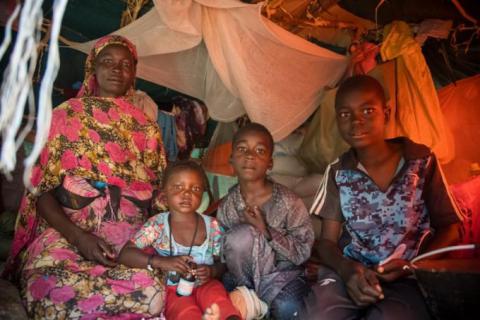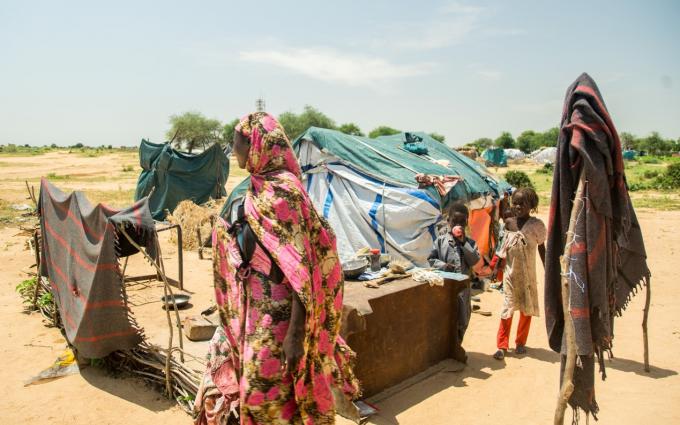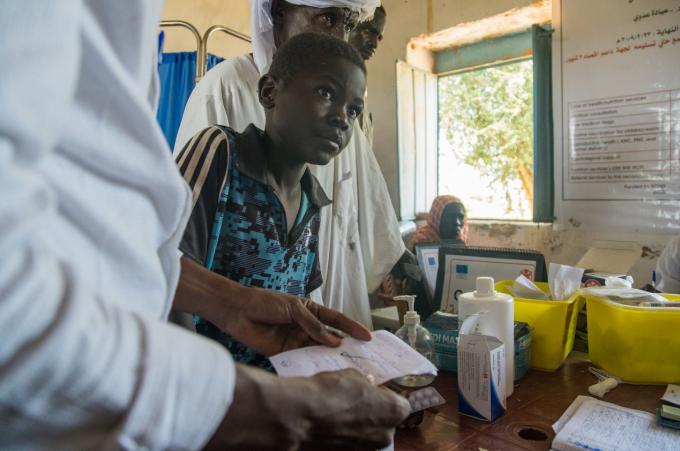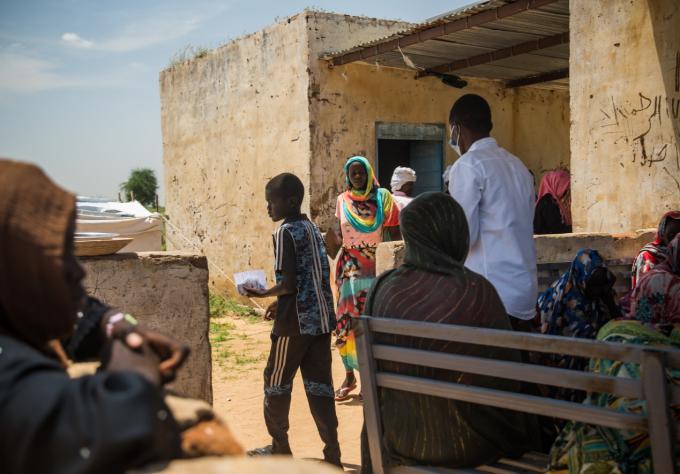Kulthom explains how the health care situation was prior to the intervention | كلثوم تشرح كيف أن الوضع الصحي أولى بالتدخل

كلثوم، التي تبلغ من العمر 27 عاماً، مزارعة وأم لأربعة أطفال تتراوح أعمارهم بين 18 شهراً و 14 عاماً. و في يونيو من عام 2022، اندلع القتال في قريتها، مما أجبر الأسرة على الفرار إلى محلية كلبس في غرب دارفور. هنا تشرح لنا ما حدث في قريتها:
"حدث ذلك صباح يوم الاثنين. رأينا كيف بدأ الرجال في الاقتتال. لم أكن على استعداد للمخاطرة بحياة أطفالي وهربنا، سعياً للبقاء على قيد الحياة."
مثل كلثوم وأطفالها، نزح أكثر من ألفي شخص إلى محلية كلبس، بعد فرارهم من اندلاع أعمال العنف في مناطقهم الأصلية في الآونة الأخيرة.

ما زالت كلثوم تتذكر عندما وصلوا لأول مرة قبل ثلاثة أشهر:
"في البداية، العائلات هنا كانوا كرماء للغاية وسمحوا لكبار السن والنساء بالبقاء في منازلهم، على الرغم من العدد الهائل من النازحين. في هذه الأثناء، كان الرجال يبحثون عن مأوى تحت ظلال الأشجار."
بعد اندلاع الأزمة، تم تفعيل آلية الاستجابة السريعة على الفور ونسقت منظمة رعاية الطفولة مع الجهة الشريكة المتمثلة في المجلس النرويجي للاجئين: حيث اتفقت المنظمتان على أن تكون منظمة رعاية الطفولة مسؤولة عن الخدمات الصحية، والتي تشمل الاستشارات المجانية والأدوية والتطعيمات الروتينية وخدمات الصحة الإنجابية والدعم النفسي وخدمات الإحالة إلى المستشفيات الكبيرة للحالات الحرجة. وفي غضون ذلك، سيوفر المجلس النرويجي للاجئين مواد المأوى للنازحين.
كلثوم تشرح كيف كانت حالة الرعاية الصحية قبل التدخل:
"قبل أن تبدأ منظمة رعاية الطفولة عملها هنا، كنا نضطر إلى ركوب السيارات والذهاب لمدة ساعتين للوصول إلى أقرب مستشفى. في الطريق، كان علينا عبور واد معرض للفيضانات، مما يعرضنا لخطر الانقطاع التام عن الخدمات الصحية. الآن، بحمد الله، تحسن الوضع كثيراً."
يقع المرفق الصحي في مكان قريب ويمكن لأطفال كلثوم طلب الخدمات الصحية بأنفسهم عندما تكون والدتهم مشغولة:
اليوم، يتوجب على كلثوم التوجه إلى السوق للبحث عن بعض الوظائف الصغيرة لتغطية احتياجات الأسرة العاجلة من زيت الطهي والطعام والصابون. في غضون ذلك، أحضر ولدها عصام، 14 عامًا، شقيقه الأصغر مصعب إلى العيادة الصحية، لأن شقيقه يعاني من ارتفاع في درجة الحرارة وصداع شديد ومشاكل في المعدة. شعر عصام بالقلق من إصابة مصعب بالملاريا.

ويشرح لنا عصام:
"منذ أن جئنا إلى هنا، ظللت أعتني بإخوتي وأختي خاصة عندما تذهب أمي إلى السوق لأنني أكبرهم سنًا. بالأمس، لاحظنا أن جسد مصعب ساخن، ويقول إن رأسه يؤلمه. أخبرت والدتي أنني سأصطحبه اليوم لمقابلة طبيب."
و يحق لمصعب، مثل أي شخص آخر في المنطقة، تلقي الاستشارات الطبية والفحوصات المخبرية والأدوية مجانًا من المرفق الصحي الذي يضم أيضًا صيدلية صغيرة.
شعر عصام بالارتياح عندما رأى نتيجة الاختبار، لأن مصعب لم تصبه الملاريا. و قام الطبيب بكتابة الدواء المناسب له لأخذه بالمنزل.
ويقول عصام:
"نحن ممتنون جدًا للعلاج الذي نتلقاه هنا. قبل يومين، كانت أختي مريضة أيضًا وبدأت في السعال. أحضرتها أمي إلى الطبيب هنا، وأعطاها شراباً. بعد ذلك تحسنت صحتها بسرعة. الآن، يتلقى أخي الصغير أيضاً الرعاية الصحية والعلاج. لا أعرف كيف كانت عائلتي ستدير خلال هذا الوقت بدون مساعدة المنظمة. شكراً لكم - إذا عدت إلى المدرسة في أي وقت، أرغب في أن أصبح طبيبًا عندما أكبر."
عصام كان يدرس في الصف السابع لكنه ترك المدرسة بسبب الأزمة الحالية وانعدام المدارس في موقع الأسرة الحالي. بقدر ما تكون الإغاثة الطارئة الفورية ضرورية لإنقاذ الأرواح، يجب إيجاد حلول دائمة لضمان عودة الأطفال مثل عصام وإخوته إلى المدرسة بأمان.
يتم تمويل آلية الاستجابة السريعة للإغاثة الفورية في حالات الطوارئ من قبل الاتحاد الأوربي ويتم تنفيذها من قبل منظمة رعاية الطفولة والمجلس النرويجي للاجئين.

Kulthom, 27, is a farmer and a mother of four children aged between 18 months and 14 years. In June 2022, fighting erupted in her home village, forcing the family to flee to Kulbus locality in West Darfur. She explains:
“It happened on a Monday morning. We saw how the men started fighting. I was not willing to risk the lives of my children and we escaped, seeking to survive.”
Like Kulthom and her children, more than 2000 people were displaced to Kulbus locality, after fleeing the recent outbreak of violence.
Kulthom still recalls when they first arrived three months ago:
“In the beginning, families herewere very generous and let the elders and women stay in their homes, despite the enormous number of people. Meanwhile, the men were seeking shelter under the shade of the trees.”
After the outbreak of the crisis, the Rapid Response Mechanism was immediately activated and Save the Children coordinated with the partner agency, the Norwegian Refugee Council: The two organisations agreed, that Save The Children will be responsible for health services, including free consultation, medicines, routine vaccinations, reproductive health services, psychological support, and referral services to larger hospitals for severe cases. The Norwegian Refugee Council would meanwhile provide shelter materials for the displaced people.
Kulthom explains how the health care situation was prior to the intervention:
“Until Save the Children started operating here, we had to drive for two hours to reach the nearest hospital. On the way, we had to cross a valley, which is exposed to flooding, putting us at risk of being completely cut off from health services. Now, the situation has improved a lot.”
The health facility is nearby and Kulthom’s children can even seek health services by themselves, when their mother is busy:
Today, Kulthom must head to the market to find some petty jobs to cover the family’s immediate needs for cooking oil, food, and soap. Meanwhile Essam, 14, is bringing his smaller brother Mussab to the health clinic, because his brother has high fever, a strong headache and stomach problems. Essam is worried that Mussab is suffering from Malaria.
He explains:
“Since we came here, I’ve been taking care of my brothers and sister especially when mom goes to the market as I am the eldest one. Yesterday, we noticed that Mussab’s body is hot, and he says his head is hurting. I told my mother, that I will take him to see a doctor today.”
Mussab, like everyone else in the area, is entitled to receive free medical consultations, lab tests and medicines from the health faclity, which also includes a small pharmacy.
Essam is relieved when he sees the test result, as Mussab does not have Malaria. The doctor subscribes the appropriate medicine to take home.
Essam says:
“We are very grateful for the treatment we receive here. Two days earlier, my sister was also sick and started coughing. My mum brought her to the doctor here, and he gave her a syrup. Afterwards her health improved quickly. Now, my little brother is also receiving healthcare and treatment. I don’t know how my family would have managed during this time without the organisation’s help. Thank you - if I ever go back to school I would love to become a doctor when I grow up.”
Essam used to study in the 7th grade but dropped out of school due to the current crisis and a lack of schools in the family’s current location. As much as the immediate emergency relief is essential to save lives, durable solutions need to be found to ensure children like Essam and his siblings can safely return to school.
The Rapid Response Mechanism for immediate emergency relief is funded by the European Union and implemented by Save the Children and the Norwegian Refugee Council.
 Sudan
Sudan